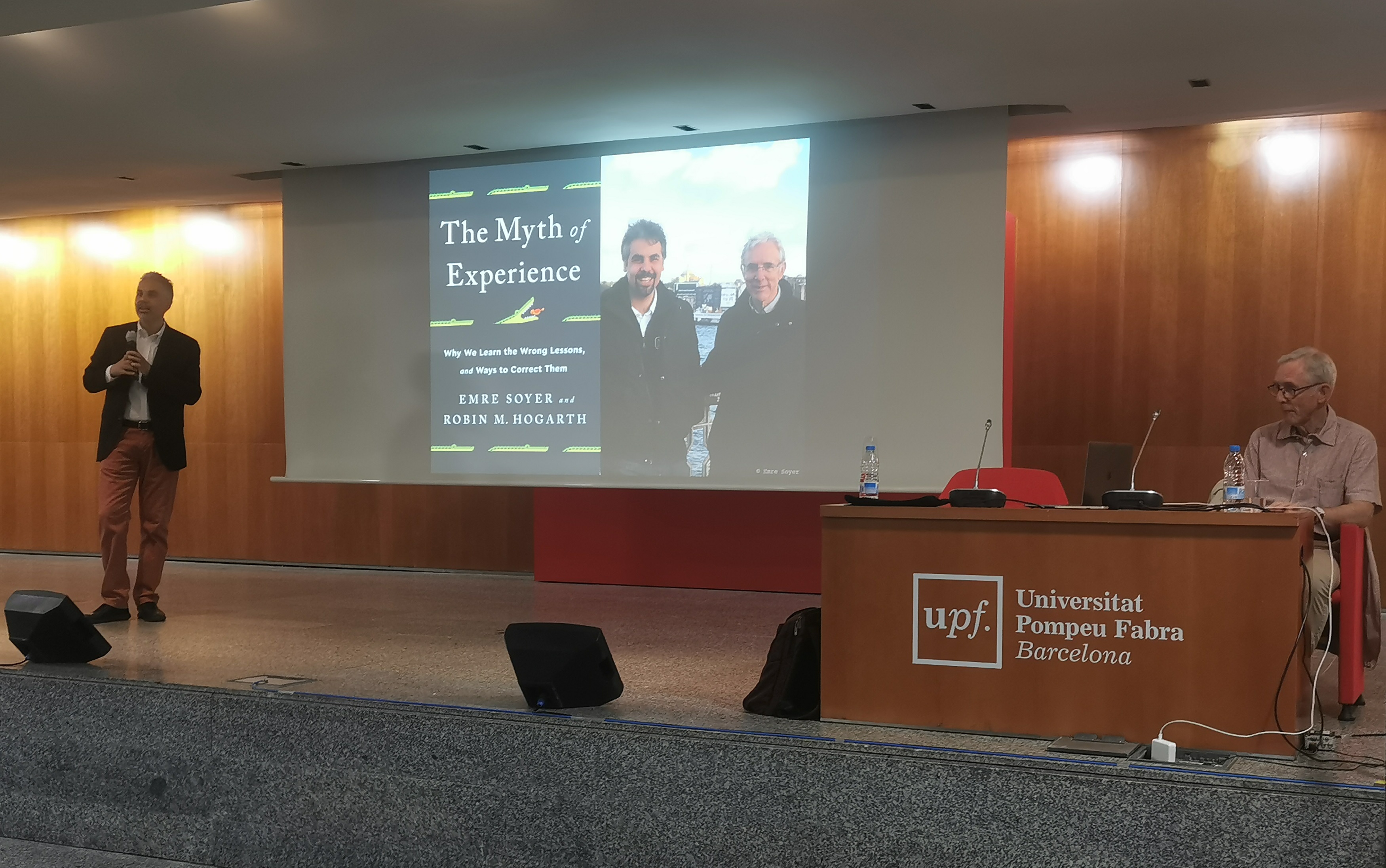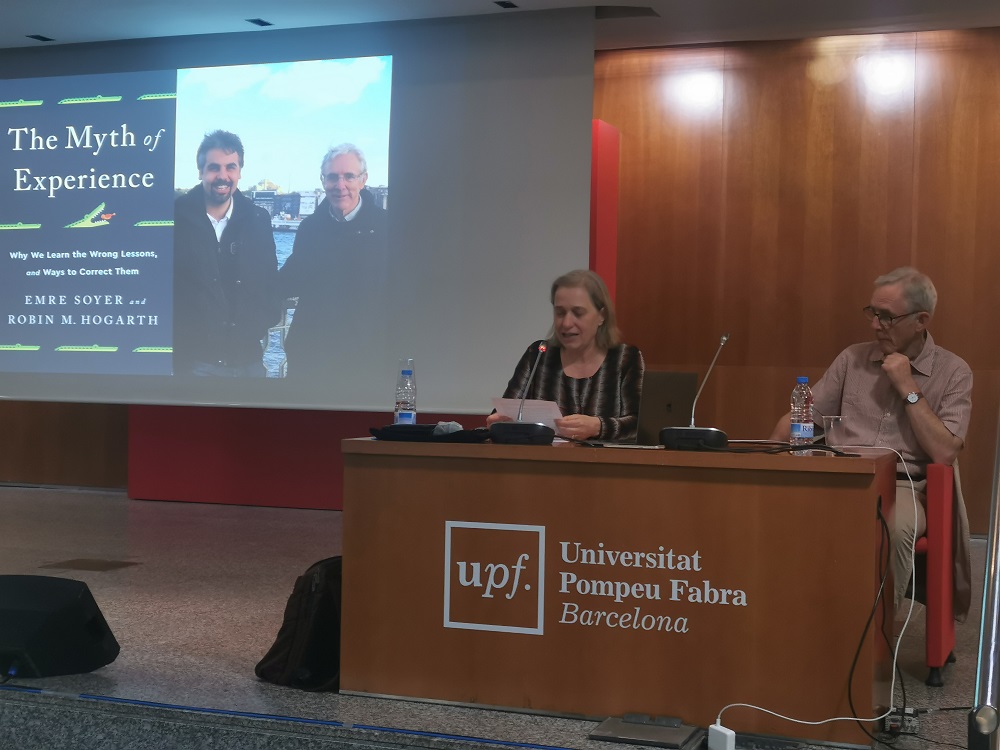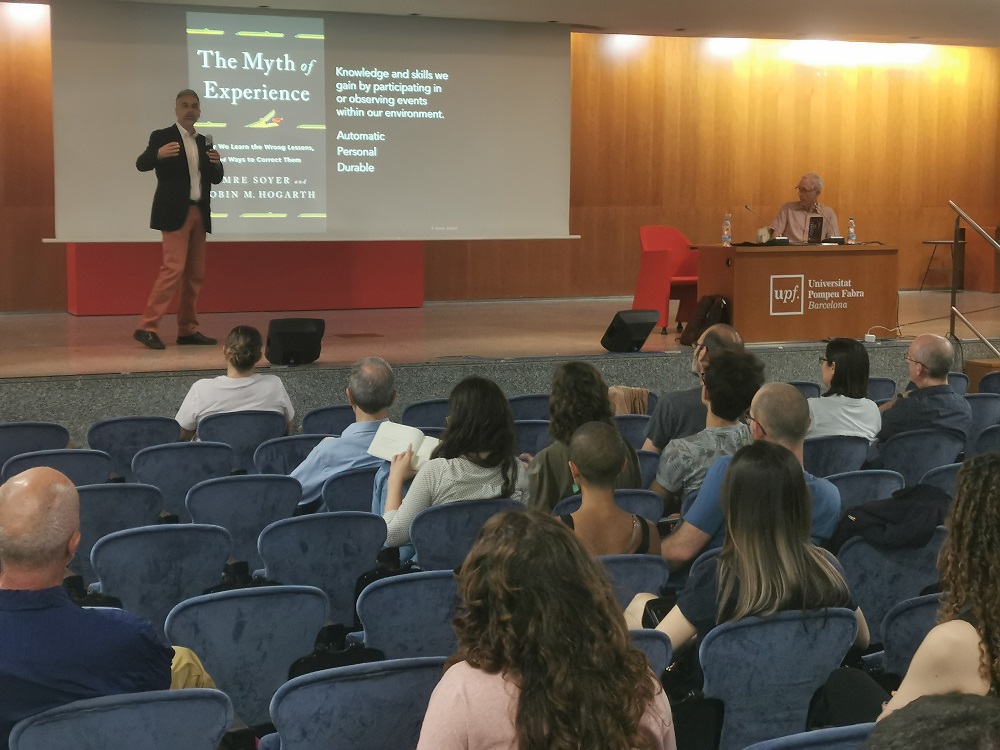Emre Soyer and Robin M. Hogarth present the book “The Myth of Experience”, a critical look at the value of experience
Emre Soyer and Robin M. Hogarth present the book “The Myth of Experience”, a critical look at the value of experience
This joint work by the PhD and his professor on the UPF doctoral programme in Economics, Finance and Management, explores learning from decisions to improve them, both in life and in business. The presentation took place on 26 May in the afternoon at the auditorium of the Ciutadella campus.

Experience is essential to properly understand the world of business and life in general. We feel reassured when we make experience-based decisions. We want leaders with exceptional careers and managers who have worked in relevant fields.
However, experience can pass through a filter or be distorted in very different ways, and reinforce misperceptions without us noticing or being aware. If we recognize this fundamental problem, we will be able to design mechanisms that help us and our organizations to learn from the lessons of experience, and we will know how to improve decision-making.
In their book, the two authors explore ways to make the right decisions and how to improve them
In their new book, The Myth of Experience: Learning the right lessons to improve decisions, published in September 2020 by PublicAffairs, Emre Soyer, a PhD in Economics from UPF, and Robin M. Hogarth, UPF emeritus professor and emeritus research professor at the BSE, explore ways to make the right decisions and how to improve them.

The presentation of the book, which was broadcast via streaming on the UPF website, took place on 26 May, in the afternoon, in the auditorium of the Ciutadella campus. It was opened by Rosmarie Nagel, an ICREA research professor with the UPF Department of Economics and Business (and one of the co-organizers, together with professors José Apesteguia and Gaël Le Mens). Professor Nagel introduced the two authors and offered a review of their academic and professional careers, of which she highlighted their role at UPF.
Then, Emre Soyer presented the work, focusing above all on the various aspects that an organization must take into account, in relation to experience, to improve, all explained through a wide variety of illustrative examples.
He mentioned the various problems that the organization may encounter: the most important are that experience underestimates the importance of preventing events that we cannot afford to live; learning from success or failure can lead to compelling illusions as to their causes, which are difficult to reverse; the design of experience subtly influences the behaviour of the user, the client and the employee, and then determines the goals set; and finally, that experience-based predictions and optimizations are incompatible with non-linear processes.
To address these problems, he talked about two solutions to which organizations can resort: on the one hand, creating a kind of “management senate”, a collaborative platform for identifying problems and generating solutions, in order to diversify the approach, detect threats and discover opportunities. On the other hand, using scientific learning, consisting of defining work of success and failure, with a sampling of both and examining the process involved; and verification and monitoring of the evolution over time. According to the authors, these measures demystify success, reduce failures, deter deceit, increase prevention and limit the design of experiences.
The last part of the event consisted of questions and answers posed to the authors by the audience
A book that takes a transformative look at experience
In The Myth of Experience, the behavioural scientists Emre Soyer and Robin Hogarth take a transformative look at experience and the many ways in which it deceives us and leads to error. The authors defend a nuanced approach, in which healthy scepticism towards lessons from experience translates into more reliable decisions and sustainable growth.
The authors defend a nuanced approach, in which healthy scepticism towards lessons from experience translates into more reliable decisions and sustainable growth.
Soyer and Hogarth illustrate the flaws of experience, with real-life examples, and create cutting-edge research as a guide to decision-making. They also provide the necessary remedies to improve our judgement and choices in the workplace and in other environments.

Difference between “kind” and “wicked” learning environments
The difference between what they call “kind” and “wicked” learning environments is fundamental to their argument. In a kind learning environment, feedback is abundant, immediate and accurate, so it is easy to learn useful lessons. And in a wicked learning environment, feedback is incomplete, delayed or simply unreliable, making it much harder to learn.
The authors state that we often find ourselves in wicked learning environments, believing that they are kind: “We take the available feedback into account, assume that we have all the information, draw erroneous conclusions and learn the wrong lessons. This is a principle that we can apply to many aspects of our lives”, they state.
In their opinion, it is important to assume that things are more complicated than they may initially seem, and that past experiences are not always a reliable guide for future ones. Thus, in order to delve deeper into the information we have available, and to know whether it will allow us to make good decisions, the authors propose to asking ourselves two questions: on the one hand, “what is missing?” And on the other, “what is irrelevant?”
“We live in a complex world, and whether we are making business decisions, following politics or even just shopping online, we often don’t have all the information we need to draw reliable conclusions. Questioning the conclusions we have drawn and looking for a more complete picture can be an essential vital skill for our daily lives”, they say.
Two experts in behavioural psychology and decision-making
Emre Soyer, a PhD in Economics from UPF, is an expert researcher in behaviour and founder of SOYER Decision Advisory, which provides organizations with talks, workshops and projects on strategic and creative decision-making. He has collaborated both at international business schools and companies in a wide variety of sectors.
Robin M. Hogarth is an emeritus professor at UPF. He holds an MBA from INSEAD and a PhD from the University of Chicago, where he was a member of the faculty of the Graduate School of Business (now Booth School). He was vice-dean, director of the Center for Decision Research and a Wallace W. Booth Professor of Behavioural Sciences. He was also responsible for the organization and operation of the University of Chicago’s executive MBA programme in Europe. The author of five books, his research focuses mainly on the psychology of behaviour and decision-making processes.
